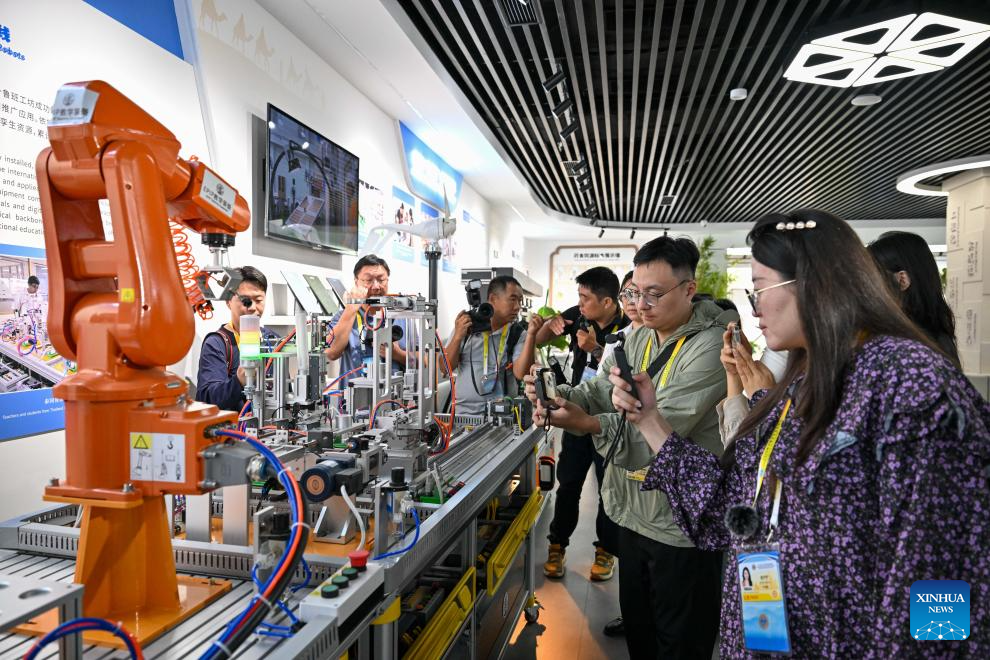
China's economy showed signs of improvement in August as policy measures established to balance domestic demand and supply took effect and a recovering capital market lifted confidence, analysts and executives said.
They cautioned, however, that sustaining the improvement will require more policy support amid external uncertainties, including fresh fiscal and monetary easing, bolder steps to stabilize the housing market and reforms to improve income distribution and spur consumption.
The official purchasing managers index for the manufacturing sector rose to 49.4 in August from 49.3 in July, indicating a modest recovery in business sentiment, the National Bureau of Statistics said on Sunday.
The improvement was supported by accelerated production and a slower contraction in market orders, the bureau said. The PMI for the non-manufacturing sector — covering construction and services — came in at 50.3 in August, up from 50.1 the previous month, pointing to a faster expansion.
A PMI reading above 50 indicates expansion, while a reading below 50 reflects contraction.
ALSO READ: China's pricing law overhaul to ensure fair competition
Zhang Di, chief macroeconomic analyst at China Galaxy Securities, said the recovery in PMI data showed the effects of policy efforts to boost domestic demand and address excessive competition in key sectors.
"The stability of domestic demand and the stock market uptrend have restored confidence in the economy, while export front-loading further bolstered production," Zhang said. The sub-index gauging capital market service activity remained above 70 for two consecutive months.
Data from the statistics bureau showed that price competition among manufacturers has eased, as input and factory price indexes reached 53.3 and 49.1, respectively, with both having risen for three straight months.
The figures also pointed to improved business expectations and continued manufacturing upgrades. In August, the PMIs for high-tech and equipment manufacturing rose to 51.9 and 50.5, respectively, while the index for manufacturers' expectations of production and operations climbed to 53.7.
Wen Bin, chief economist at China Minsheng Bank, said that with policy measures taking hold and the peak production and sales season approaching in September and October, key economic indicators are expected to improve further.
READ MORE: China's manufacturing PMI at 49.4 in August
However, Wang Qing, chief macroeconomic analyst at Golden Credit Rating International, noted that the real estate sector's adjustment continued in August while consumer spending remained weak, leaving the manufacturing PMI in contraction territory for the fifth consecutive month.
The PMI for the construction industry, which is closely tied to real estate, fell to 49.1 in August from 50.6 the previous month, the NBS said.
Third-quarter economic momentum may wane compared with the second quarter as export front-loading tapers off while the property market adjustment lingers, Wang said. This means additional policies, including ramped-up fiscal support, stronger measures to stabilize the property market, interest rates cuts and lowered reserve requirement ratio, will likely spur demand in the fourth quarter.
Xu Gao, chief economist at BOC International, said recently that stronger efforts to bolster demand remain essential alongside measures to manage capacity. He added that restructuring income distribution to boost consumption should be the top priority.
Premier Li Qiang stressed the importance of efforts to meet the country's annual socioeconomic development goals and solid measures to consolidate the stabilizing trend in the property market while chairing the ninth plenary meeting of the State Council, China's Cabinet, in August.
Yin Kuo — chairman of Shenzhen Xiaokuo Technology Co, the company behind tooth care brand Canban — said long-term confidence in China's economic fundamentals remains strong despite short-term volatility.
"In the long run, we have the world's best supply chain and some of the most hardworking and innovative entrepreneurs," Yin said. "GDP continues to grow steadily, and in this environment, some short-term volatility is completely normal."


